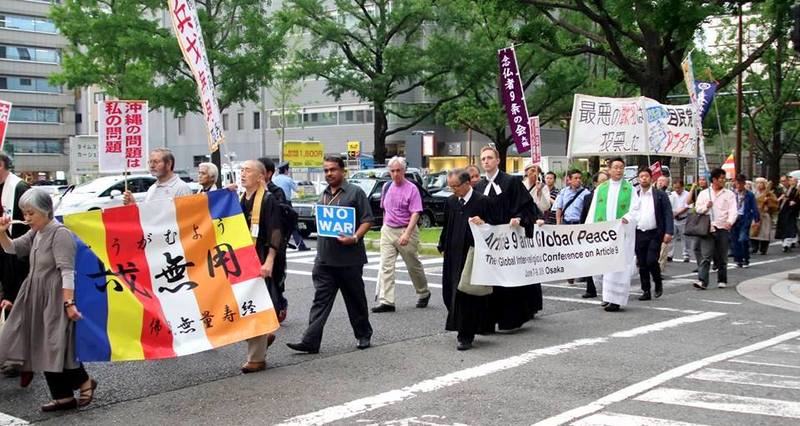Asian Churches Participate in Campaign Against Revision of Article 9 of Japan’s Constitution
[caption id="attachment_1769" align="aligncenter" width="800"] CCA's General Secretary joined others during Peace March in Osaka, Japan[/caption]
CCA's General Secretary joined others during Peace March in Osaka, Japan[/caption]
Representatives of several Asian churches gathered for the fifth inter-religious conference to oppose the Japanese government’s attempts to revise Article 9 of Japan’s peace Constitution. Japan adopted its war-renouncing constitution following World War II, with Article 9 as a promise to itself and a pledge to the world, particularly neighboring countries that suffered under Japanese invasions and colonial rule, to never repeat its mistakes.
About 120 participants attended the global event held at the Mimami Mido Buddhist Temple in Osaka, Japan from 7-9 June, 2016.
In a communique adopted at the end of the conference the participants expressed concerns that, “ Revising Article 9 of Japan’s historic peace Constitution will bring about serious instability in Asia region as it opens the door for Japanese militarism. The move by the current Japanese administration and the interpretation of the Constitution is a threat to constitutional guarantees and democratic governance in Japan”.
The communique stated the hope of the participants that, “Japan should never be a threat or destabilizing factor to neighboring countries nor become a destabilizing factor”.
It further added that “ the Abe administration should look honestly at Japan’s history of invasion, colonization, and militarism in the modern era and make a clear apology to the world”.
Prof. Tetsuya Takahashi of University of Tokyo stated in a keynote presentation that, “Article 9 continues to inspire peace loving people and communities throughout the world. However, the contradiction between Article 9 and the US military presence, in particular deepening military alliance between U.S and Japan is a serious concern. What shapes Japan today is not Article 9, but the US-Japan Security Treaty”.
“In a context like in Okinawa, U.S Japan security treaty is more visible and 75% of US bases in Japan are concentrated on this small main island, many in close proximity to heavily populated cities. In Okinawa, the Article 9 is being violated every day as peace and security of people are being threatened”, Prof. Takahashi added.
The General Secretary of the Christian Conference of Asia (CCA) Dr. Mathews George Chunakrara in a presentation said that “ the most recent developments with regard to changes in strategic and defense polices of Japanese and U.S government aimed at reciprocal procurement of arms and defense equipment, which will eventually lead to increasing role of Japan’s militarism”.
He added that, “one of the major problems in relation to change of Article 9 would be a matter of concern of perpetual support to the US military by the Japanese Self Defense Force (SDF)”.
The Coordinator of the Fifth Global Inter-religious Conference, Yoichi Noguchi said, “The global conference organised by various Japanese organisations took place at a time when Article 9 faces the most serious threat of being abandoned since the post-war constitution of Japan was enacted in 1947".
In his introductory remarks, Rev. Kobashi Kouichi, Moderator of the National Christian Council of Japan stated, “At a time when peace in the world is seriously in crisis, the responsibility of people belong to different faiths is to turn the crisis towards peace”.
The fifth global conference concluded with a colorful peace march organised by the local host committee in which hundreds of peace activists, religious leaders and representatives of civil society organisations across the world marched on the streets of Osaka.
The CCA member churches and ecumenical councils participated in the conference include, the Anglican Church of Japan, United Church of Christ in Japan, Korean Christian Church in Japan, National Christian Council in Japan, Hong Kong Christian Council, Presbyterian Church in Korea, Presbyterian Church in Republic of Korea, Anglican Church in Korea, Korean Methodist Church, and National Council of Churches in Korea.










